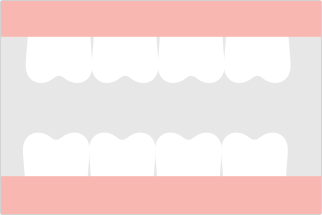Restorative Care
Restorative care includes repairing missing parts of your teeth structure and replacing missing teeth. Your teeth structure can be missing as a result of decay, a tooth fracture, or the deterioration of a previously placed restoration.
Midwest Dental offers the latest in restorative treatments and technologies to help restore your smile. Our restorative solutions include:
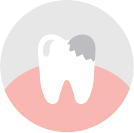
Fillings
To treat a cavity, your dentist will remove the decayed portion of the tooth and then "fill" the area on the tooth where the decay was. Fillings are also used to repair cracked, broken or injured teeth and teeth that have been worn down from nail-biting, tooth grinding or other misuse.
Teeth can be filled with white porcelain, silver amalgam or a white glass material called composite resin fillings. Your dentist's recommendation helps determine the type of filling that will best address your needs. General considerations include the extent and location of the decay, the cost of the filling material, and your insurance coverage.
Caring for fillings
To maintain your fillings you should follow good oral hygiene practices - visit your dentist regularly for cleanings, brush with a toothpaste containing fluoride, and floss at least once daily. If your dentist suspects that a filling might be cracked, he or she will take x-rays to assess the situation. If your tooth is extremely sensitive, you feel a sharp edge, you notice a crack in the filling, or a piece of the filling is missing, call your dentist for an appointment.
Request an Appointment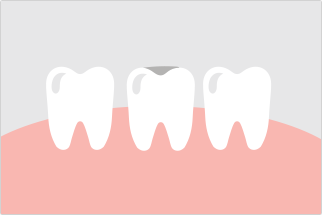
Crowns
A crown, also known as a cap, covers a tooth to restore it to its normal shape and size, thereby strengthening and improving its overall appearance. A crown may be recommended to cover and support a tooth with a large filling. A crown can be used to attach a bridge, protect a weak tooth from breaking, or restore one that is already broken.
Request an Appointment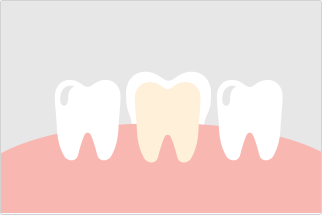
Bridges
A bridge is a dental appliance that replaces one or more natural missing teeth, thereby "bridging" the space between two teeth. Fixed bridges are cemented onto teeth on either side of the space. Unlike removable partial dentures, fixed bridges cannot be taken out of the mouth by the patient. If you are missing any teeth and are committed to maintaining good oral hygiene practices, you may be a good candidate for a bridge. If left unfilled, this space can cause the surrounding teeth to drift out of position and can cause teeth and gums to become more susceptible to tooth decay and gum disease that can cause further tooth loss. Fixed bridges not only correct an altered bite, improve your chewing ability and speech, but they also safeguard your appearance by preventing the collapse of your facial features that can cause premature wrinkles and age lines.
Caring for Bridges
With a bridge, it is more important than ever to brush, floss, and see your dentist regularly. If you do not control the buildup of food debris and plaque - the sticky film of bacteria formed from food acids - your teeth and gums can become infected, requiring further treatment and resulting in possible loss of the bridge. Your dentist may also recommend using floss threaders that help remove bacteria from hard to reach spaces between the bridge and adjacent teeth and gums.If you maintain optimal oral hygiene care, you can expect your fixed bridge to last as many as 8-10 years, or even longer.
Request an Appointment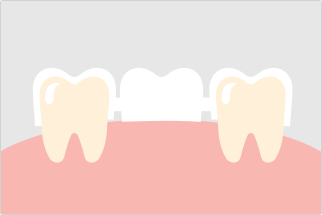
Implants
Despite improvements in dental care, millions of Americans suffer tooth loss - mostly due to tooth decay, gingivitis (gum disease), or injury. For many years, the only treatment options available for people with missing teeth were bridges and dentures. That all changed with the popularity of dental implants that are quickly becoming the standard of care.
Dental implants are replacement tooth roots. Implants provide a strong foundation for fixed (permanent) or removable replacement teeth that are made to match your natural teeth. Some advantages of dental implants include improved appearance, speech, comfort, and oral health. Eating will be easier and pain-free. Implants are also very durable. With good care, many implants last a lifetime. Because implants are not removable, there is no need for adhesives to keep your dentures in place.
Caring for Implants
Dental implants require the same care as permanent teeth, including brushing, flossing, and regular dental check-ups. Request an Appointment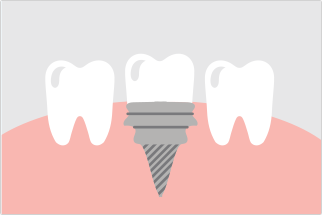
Root Canal Treatment
A root canal is a treatment used to save a tooth that is badly decayed and/or infected. Nerve and pulp, the soft area within the center of the tooth, can become irritated, inflamed, and infected due to deep decay, repeated dental procedures on a tooth, large fillings, a crack or chip in the tooth, or trauma to the face. During a root canal procedure, the nerve and pulp is removed and the inside of the tooth is cleaned and sealed.
Root canal procedures have the reputation of being painful. In reality, most patients report that the procedure itself is no more painful than having a filling placed. The discomfort experienced in the period leading up to dental care is truly the painful period of time, not the root canal procedure itself.
Signs you may need a root canal:
What Should I Expect After the Root Canal?
The root canal procedure should relieve the pain you feel. Until your root canal procedure is completely finished - that is to say, the permanent filling is in place and/or the crown is placed, it is wise to minimize chewing on the tooth under repair. This step will help avoid re-contamination of the interior of the tooth and also may prevent a fragile tooth from breaking before the tooth can be fully restored. For the first few days following completion of treatment, the tooth may feel sensitive due to natural tissue inflammation, especially if there was pain or infection before the procedure.
As far as oral health care is concerned, brush and floss as you regularly would and see your dentist at normally scheduled intervals. The final step of the root canal procedure is application of a restoration such as a crown, to cover and protect the tooth.
Request an Appointment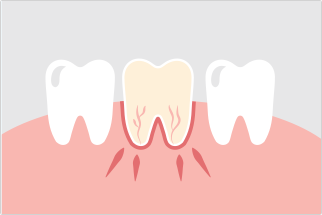
Dentures
A denture is a removable replacement for missing teeth and adjacent tissues. Complete dentures replace all the teeth, while a partial denture fills in the spaces created by missing teeth and prevents other teeth from changing position, similar to a bridge. Complete dentures are either "conventional" or "immediate." A conventional denture is placed in the mouth about a month after all the teeth are removed to allow for proper healing, whereas an immediate denture is placed as soon as the teeth are removed.
Who needs a denture?
Candidates for complete dentures have lost most or all of their teeth. A partial denture is suitable for those who have some natural teeth remaining. A denture improves chewing ability and speech, and provides support for facial muscles. It will greatly enhance the facial appearance and smile.
How do you care for a dentures?
Even if you wear full dentures, you still must take good care of your mouth. Brush your gums, tongue, and palate every morning with a soft-bristled brush before you insert your dentures to stimulate circulation in your tissues and help remove plaque.
A denture is fragile, so it is important to handle it with care. Remove and brush the denture daily, using products designed specifically for cleaning dentures. Don't sterilize your denture with boiling water because it will cause it to warp. If you wear a partial denture, be sure to remove it before brushing your natural teeth. When not in use, soak it in a cleanser solution or in water. Get in the habit of keeping the denture in the same safe and handy place to reduce the likelihood of misplacement.
Continue seeing your dentist regularly
It is important to continue having regular dental checkups so that a dentist can examine oral tissues for signs of disease or cancer. As you age, your mouth will continue to change as the bone under your denture shrinks or recedes. To maintain a proper fit over time, it may be necessary to adjust your denture or possibly remake your denture. Never attempt to adjust a denture yourself and do not use denture adhesives for a prolonged period because it can contribute to bone loss. When in doubt, consult your dentist.
Request an Appointment